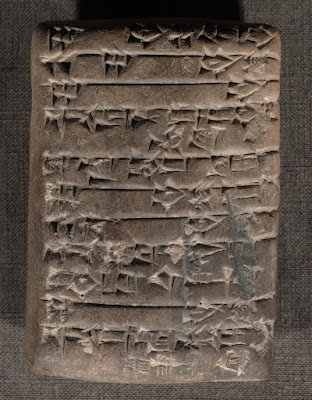I decided after much thought that I’d go with my selection of First discoveries that made a difference to the human race. Not the accidental ones like the use of fire but ones that were as a result of human thought. I was going to try a list of importance but that led to problems so I’m going chronologically.
Writing: I think there is a very strong case to be made for the invention of writing to be the most important of all inventions. Everything else, for humanity, follows on from it. And for that we have to go back to Mesopotamia (where else) in around 3,200 BCE. In southern Iraq there were a series of city states including, for instance, Uruk and at first symbols were inscribed on clay tablets by a reed stylus to show how many goats or beer etc were being counted. That eventually became too cumbersome a system and over only a few years the symbols were modified to create characters representing the sounds of the Sumerian language and consequently other languages. This system is called Cuneiform. Ignore any claims made by Egyptologists.
The Earth is Round: Not an obvious statement from the literal standpoint of a human being. However, in the year 240 BCE a certain Eratosthenes, a Greek citizen from the city of Cyrene (now part of Libya) observed that at noon on the Summer Solstice in Alexandria, the Sun was directly overhead. He knew that in Aswan, about 800 kilometres to the south, the Sun would be at an angle of 7.2 degrees from vertical at the same time. By measuring the angle of the Sun’s rays at both locations and using geometry, Eratosthenes was able to calculate that the Earth had a circumference of about 28,735 miles. This is close to the modern value of 24,850 miles. Apart from the practical advantages from discovering this fact I do feel that this must have been a real psychological jolt to people at the time. I will add to this the first time that it was found that the Earth went round the sun.
 |
| Calculating Earth's Circumference |
Cinema: I’m not sure about this one but it seems to me that although humanity has always made images of themselves the invention of a method to actually see oneself moving and talking from youth to age might have a profound influence on human psychology.
Space: I can’t not include the first time a human being left the confines of our planet. I vividly remember staying up all night (together with most of humanity) watching the moon landings but the honour of the first person into space belongs to Yuri Gagarin. On April 12, 1961, aboard the spacecraft Vostok 1, he became the first human being to travel into space. During the flight, the 27-year-old test pilot and industrial technician also became the first man to orbit the planet, a feat accomplished by his space capsule in 89 minutes. Vostok 1 orbited Earth at a maximum altitude of 187 miles and was guided entirely by an automatic control system. The only statement attributed to Gagarin during his one hour and 48 minutes in space was, “Flight is proceeding normally; I am well.”
I’m going to stick to a top 5 but I’m sure that others will have a different, but wrong, opinion.
The Four Quartets by T S Eliot
Number 1
Burnt Norton
Time present and time past
Are both perhaps present in time future,
And time future contained in time past.
If all time is eternally present
All time is unredeemable.
What might have been is an abstraction
Remaining a perpetual possibility
Only in a world of speculation.
What might have been and what has been
Point to one end, which is always present.
Footfalls echo in the memory
Down the passage we did not take
Towards the door we never opened
Into the rose-garden. My words echo
Thus, in your mind.
But to what purpose
Disturbing the dust on a bowl of rose-leaves
I do not know.
The Four Quartets by T S Eliot
Number 1
Burnt Norton
Time present and time past
Are both perhaps present in time future,
And time future contained in time past.
If all time is eternally present
All time is unredeemable.
What might have been is an abstraction
Remaining a perpetual possibility
Only in a world of speculation.
What might have been and what has been
Point to one end, which is always present.
Footfalls echo in the memory
Down the passage we did not take
Towards the door we never opened
Into the rose-garden. My words echo
Thus, in your mind.
But to what purpose
Disturbing the dust on a bowl of rose-leaves
I do not know.
Thanks for reading, Terry Q.



6 comments:
Very good Terry. Maybe third time lucky for Birmingham City? (It worked for Blackpool!)
Spooky. I've just read another 'Firsts' blog featuring Alexandria. What are the chances of that? I might have been tempted to go for telephone ahead of cinema, but this was a stimulating read.
I was fascinated to read about Eratosthenes. Such a precise calculation. And maybe the earth has shrunk in the last 2,000 years!
A thoroughly entertaining read and sound choices. Maybe the wheel as well?
Surely no opinion can be wrong? 😉
Reading about Eratosthenes was eye opening - who knew? Always am educated reading your blogs - fascinating. Good choices :) What came first the chicken or the egg comes to mind :)
Post a Comment